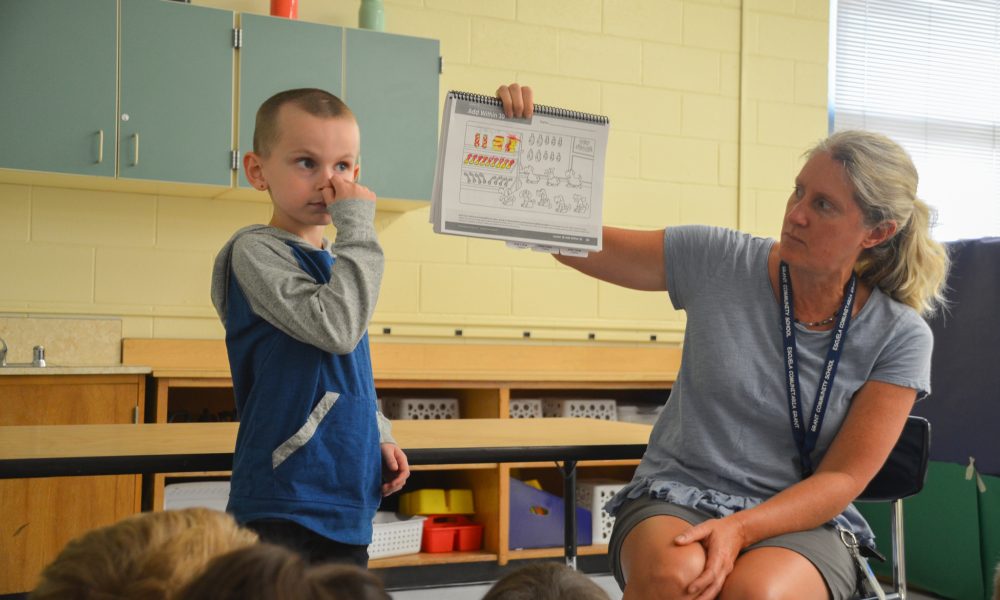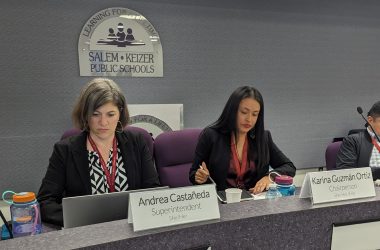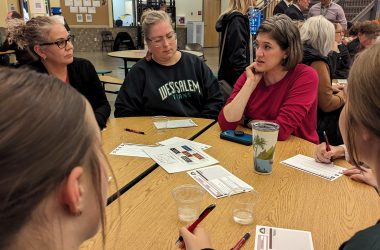
Teacher Dena Archibald helps first-grade student Zander McCurry present a math problem during a summer school class at Grant Elementary School on July 16, 2019 (Rachel Alexander/Salem Reporter)
Dena Archibald leaned over a first-grade student’s desk on a warm July morning at Grant Elementary School.
She pointed to a grid of circles on a worksheet, some of which he’d colored in.
“There’s eight altogether – how many of those are red?”
“Six,” the boy said.
Archibald helped him write that out in what she called a “number sentence” – 6+2 = 8.
[ KEEP YOUR LOCAL NEWS STRONG – SUBSCRIBE ]
For three years, Salem-Keizer has offered summer school to incoming students in first and second grade at its highest-poverty elementary schools.
This summer’s program was the first to focus on math instead of reading. Teachers worked with a new curriculum and recently released test results show the summer lessons had a modest but measurable impact among students’ math understanding.
About 400 students from more than 20 elementary schools attended three weeks of classes over the summer.
At Grant Elementary, 60 kids from four schools counted blocks, checked out library books and talked with teachers about how to be good listeners. Math occupied most of the day.
“It was a great growth last year for the literacy so we’re hoping to see the same thing with the math,” said Julia Bradley, the lead teacher for the Grant program.
Nearly 300 took the same test at both the beginning and end of summer school, with a possible score of up to 15.
Between the start and end of school, nearly every student’s score went up by one to five points. It’s a small increase, but one that summer school coordinator Shanda Brown said was encouraging.
Any increase “in three weeks of instruction is pretty good,” she said.
And one in four students improved their scores by six or more points.
The new curriculum, called ReadyMath, was adopted at all district elementary schools last year.
Summer lessons focused on what educators call “math discourse.” Rather than simply memorizing that 2+2 = 4, the goal is for students to recognize that there are multiple ways to get to the right answer and explain the thinking behind their solution.
Salem-Keizer targets students in elementary schools where most students are low-income because those students often lag behind their wealthier peers in academic achievement. Those gaps are visible as students enter kindergarten: students in wealthier schools may know 15 letters of the alphabet, while those in poorer schools recognize four to six.
Using federal funds, the hope is to help them catch up – and give teachers more opportunities to work with a new curriculum.

Sumpter Elementary School librarian Lynda Woodworth checks out a book for a summer school student at Grant Elementary on July 16, 2019 (Rachel Alexander/Salem Reporter)
Literacy has been a focus in past years because it’s a more basic skill – kids who can’t read have trouble doing math problems too. But the district’s scores on state math assessments have lagged behind its reading scores. District leaders hope having a standard curriculum is a step toward changing that.
Teachers who worked summer school got one-on-one coaching on ReadyMath to get them more comfortable and confident with the lessons.
“They’re really excited to go back to their buildings and be able to share that with their colleagues,” Brown said.
Archibald, who taught at Grant last year, said the extra practice was helpful. She didn’t teach math last year because she was part of the English staff for Grant’s dual-language program. But this fall, she’s starting a new job at Cummings Elementary where she’ll use the curriculum.
Her biggest lesson?
“DO LESS TALKING!!!” she wrote in an email. Students should do most of the talking since they’re the ones who need to learn and explain their thinking.
She also saw growth in her first-grade students, she said. Most came in understanding that a number plus zero was the same number. But over the course of the summer, she saw them grow to understand more complicated addition, like that there are several ways to add smaller numbers to get 8.
“The side by side coaching is invaluable in my opinion,” Archibald wrote. “It helps me to refine my practice and “see” things I may not have thought about.”
Class sizes were small – usually ten or fewer students with a teacher and instructional assistant. In some cases, the students were placed with the classroom teacher’s they’ll have in the fall, giving them a chance to get to know each other before school starts.
In Archibald’s class, students gathered on the rug to present their work. As she called them up, they showed their classmates an addition problem they’d created off the same worksheet.
One boy, Zander McCurry, was triumphant in his newfound math knowledge.
“This is so easy! I did three,” he announced to the class.
Reporter Rachel Alexander: [email protected] or 503-575-1241.

Rachel Alexander is Salem Reporter’s managing editor. She joined Salem Reporter when it was founded in 2018 and covers city news, education, nonprofits and a little bit of everything else. She’s been a journalist in Oregon and Washington for a decade. Outside of work, she’s a skater and board member with Salem’s Cherry City Roller Derby and can often be found with her nose buried in a book.









